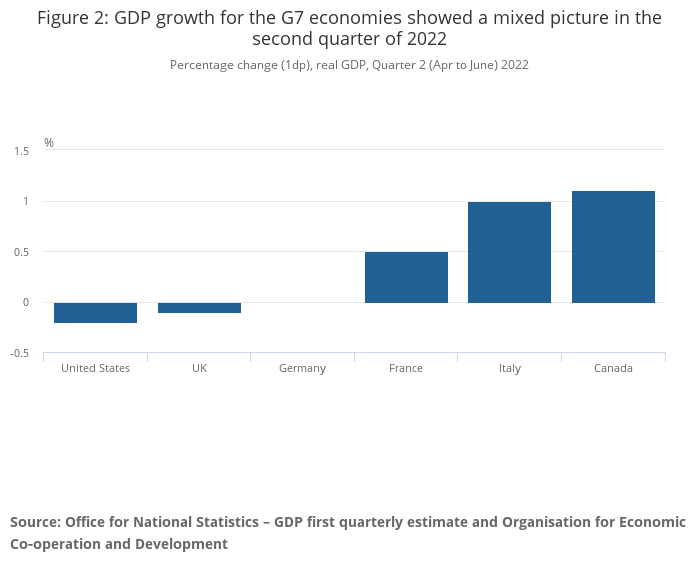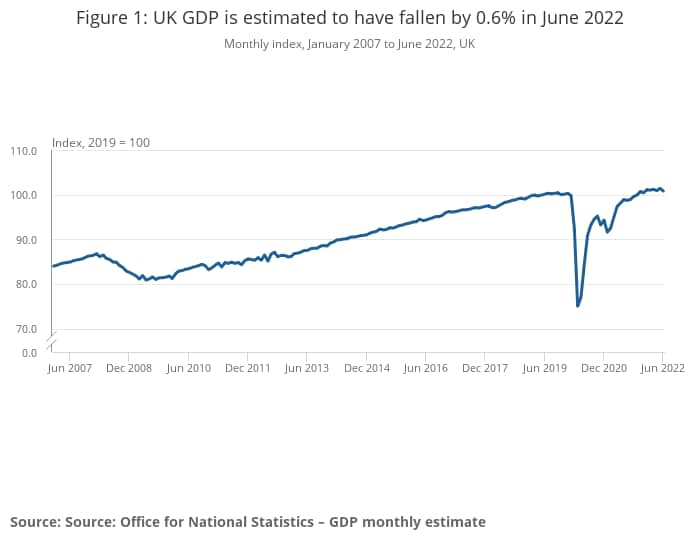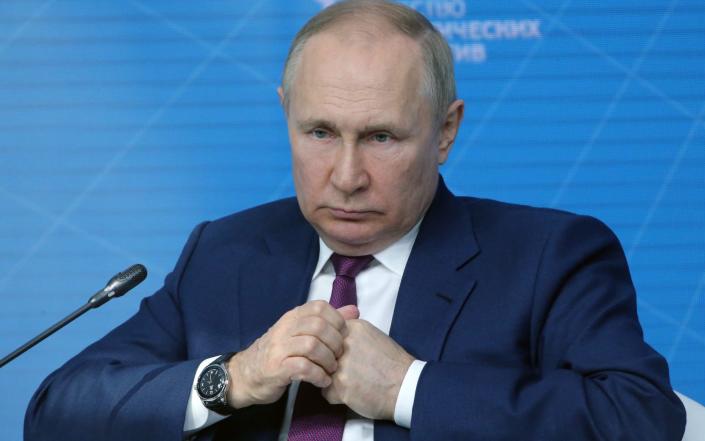
UK imports of Russian energy dropped to zero in June as Britain cut out Vladimir Putin’s fuel.
Imports of fuel, “a historically important commodity for trade with Russia” reached £0.0bn by the end of the second quarter, the Office for National Statistics said.
Overall imports continued to fall reaching the lowest on records going back to 1997.
Britain has historically had sizeable Russian energy imports, which made up 4pc of gas, 9pc of oil and 27pc of coal used in the UK last year.
However, it has never been as dependent upon the Kremlin’s energy as many European countries are.
The UK and EU have united to introduce sanctions on Russian coal and oil, partial or full bans on which are set to kick in by the end of this year, and have both pledged to reduce reliance on Russian gas.
It came as the UK’s trade deficit widened to a record £27.9bn as a result of inflationary pressures and surging fuel imports.
02:27 PM
Warning over energy bill stealth charge
Households cutting back on gas and electricity use to save money are being stung by “standing charges” that are applied no matter how much energy they use.
My colleague Tom Haynes reports:
Standing charges – also known as ‘daily unit rates’ – are set by energy companies, and are added to customers’ bills at a flat rate.
Speaking on BBC’s Today programme, Emely Seymour, an energy expert at Which?, said high standing charges were frustrating to households who were being charged despite their attempt to save money through reduced usage.
Standing charges are incorporated into the price cap, set by the energy watchdog Ofgem, which limits the amount providers can charge customers on variable tariffs.
But rates can vary across the country, meaning those living in areas such as the South West, where transporting electricity is more costly, pay more than those who live in areas like London.
01:50 PM
Schroeder sues to reclaim Bundestag office


Gerhard Schroeder, Germany’s former chancellor, is suing the Bundestag to reclaim he government-funded office and staff – which were taken away after he refused to cut ties with Vladimir Putin.
Bloomberg reports:
Michael Nagel, Schroeder’s lawyer, claimed the decision by lawmakers in the Bundestag to suspend the right to his office lacked any legal basis.
“These kind of decisions, which are reminiscent of a absolutist principality, can’t prevail under the rule of law,” Nagel said in a statement. “The decision is arbitrary.”
Schroeder, a Social Democrat like current Chancellor Olaf Scholz, led a ruling coalition in Berlin from 1998 to 2005. Once out of office, Schroeder’s close ties to Putin and refusal to give up lucrative posts with Russian state-owned energy companies became an embarrassment for his party.
01:31 PM
Wall Street set to open higher
Just about an hour until the US open, and it’s feeling a lot like a Friday in mid-August around here.
Wall Street stocks are set to rise – futures are pointing to gains of about 0.4pc on the benchmark S&P 500.
The gauge is still roughly 12.3pc below its January peak, although UK investors who own US shares will be feeling the pain of that fall somewhat less thanks to the slump in the value of the pound since then.
01:10 PM
European gas set for fourth weekly gain as crisis grows
European natural gas prices – which are at the heart of the energy omnicrisis facing the continent – are set to notch up a fourth week of consecutive gains.
Dutch front-month futures, the European benchmark, have dipped slightly today but are still up on the week.
Countries are scrambling to build gas reserves amid fears Vladimir Putin will turn off the taps this winter.
12:09 PM
Half of England to be moved into drought status
More than half of England are to be moved into drought status, the Department for Environment, Food and Rural Affairs said.
My colleague Emma Gatten reports:
Eight of 14 areas in England will be declared in drought status: Devon and Cornwall, Solent and South Downs, Kent and South London, Herts and North London, East Anglia, Thames, Lincolnshire and Northamptonshire, East Midlands.
Yorkshire and the West Midlands are expected to move into drought later in August.
11:24 AM
EU president Czechia floats ban on Russia visas
Czechia, which holds the European Union presidency, has reportedly floated the idea of a blanket ban of visas for Russian citizens as a new escalation in the sanctions war with Moscow.
A statement by Prague’s foreign minister Jan Lipavsky, obtained by AFP, says:
The flat halting of Russian visas by all EU member states could be another very effective sanction.
In a time of Russian aggression, which the Kremlin keeps on escalating, there cannot be talks about common tourism for Russian citizens.
Such a move has also been supported by Finland and Estonia, whose prime minister tweeted earlier this week:
Stop issuing tourist visas to Russians. Visiting #Europe is a privilege, not a human right. Air travel from RU is shut down. It means while Schengen countries issue visas, neighbours to Russia carry the burden (FI, EE, LV – sole access points). Time to end tourism from Russia now
— Kaja Kallas (@kajakallas) August 9, 2022
11:06 AM
Magic truffles face Dutch tax blow
Bit of an offbeat summer tax story: the ‘magic truffles’ sold in some Amsterdam shops, face being slapped with a 21pc value added tax after judges ruled they don’t count as food.
Per Dutch News:
The case was taken to court by a truffle seller who said his products should fall under the 9pc btw rate which covers food. Truffles had fallen under the low rate since they first went on sale in 1997, but in 2019, the tax office said they should be charged at the normal, higher rate.
In the new court ruling, published last week, judges say that the truffles are a stimulant and should therefore fall under the same btw rating as alcohol and tobacco products.
10:57 AM
Pound stumbles despite GDP beat
Sterling’s having a fairly poor day today, despite UK growth coming in stronger than expected.
As ever, it’s probably worth looking to the US side for a reason – this might well be an unwinding of some of the losses the dollars suffered earlier this week as investors pared back bets on Federal Reserve rate increases following softer-than-expected inflation.
10:36 AM
Flutter mulling up to 200 job cuts in UK and Ireland, boss warns
Flutter shares are continuing to soar today following its upbeat earnings, but there is a sting in the tail for employees: boss Peter Jackson says as many as 200 jobs in the UK and Ireland may be cut as it reviews operations.
Some staff could be relocated to more profitable parts of the business, he added, saying the review is expected to conclude by the end of the next month.
10:11 AM
Government plots new relief for energy-intense industries
The Government has launched a consultation looking at way of supporting energy-intensive industries such as steel, paper and cement.
In a statement, the Department for Business, Energy and Industrial Strategy said:
The UK Government is consulting on the option to increase the level of exemption for certain environmental and policy costs from 85pc of costs up to 100pc.
This reflects higher UK industrial electricity prices than those of other countries including in Europe, which could hamper investment, competition and commercial viability for hundreds of businesses in industries including steel, paper, glass, ceramics, and cement, and risk them relocating from the UK.
BEIS said this would help “around 300 businesses supporting 60,000 jobs in the UK’s industrial heartlands”.
Business secretary Kwasi Kwarteng said:
With global energy prices at record highs, it is essential we explore what more we can do to deliver a competitive future for those strategic industries so we can cut production costs and protect jobs across the UK.
10:04 AM
Eurozone factories stronger than expected
Just in: industrial production in the eurozone rose 0.7pc in June, and was stronger than previously thought in May (revised to +2.1pc, versus +0.8pc on an earlier estimate).
It’s an upbeat sign that defies wider worries about a slowdown driven by the energy crisis gripping the continent.
09:57 AM
ICYMI: Truss rules out windfall tax increase
[embedded content]
In case you missed our splash today: Liz Truss on Thursday night rejected calls to increase the windfall tax on energy companies to fund cost of living handouts for households, saying profit is not a “dirty word”.
Our lobby team reports:
The Foreign Secretary said she was “absolutely” against such taxes, arguing that such a policy approach would be taken by Labour.
The remarks are her clearest yet on the subject and come despite the Treasury devising an expansion of the windfall tax as an option for the next prime minister.
As a new forecast predicted that annual energy bills could soar to more than £5,000 next April, Ms Truss also said she would lift the ban on fracking.
09:47 AM
Money round-up
Here are some of the day’s top stories from the Telegraph Money team:
09:21 AM
Flutter flies on upbeat US assessment
Gambling giant Flutter Entertainment is leading FTSE 100 risers today, popping 9pc higher after saying there had been “no discernable” slowdown from customers.
The group – which operates PaddyPower and others – said its US business is also performing better than expected.
That has been welcomed by markets, because America is seen as a key growth area.
Chief executive Peter Jackson said:
We are particularly pleased with momentum in the US where we extended our leadership in online sports betting with FanDuel claiming a 51pc share of the market and number one position in 13 of 15 states, helping contribute to positive earnings
09:05 AM
Rhine likely to fall below critical point today


The Rhine – Germany’s key waterway – is expected to become impassable at a key chokepoint today as a heatwave devastates Europe.
Water levels at Kaub, a particularly shallow point of the river, are likely to fall below 40cm today according to Government data. At that point, many of the barges that use the river will be unable to pass.
As Bloomberg neatly sums it up:
The Rhine is used to ship everything from fuels to chemicals, paper products to grains. The climate crisis on the river couldn’t happen at a worse time, with Europe already in the grips of an energy supply crunch in the wake of Russia’s war in Ukraine. The twin crises have sent costs soaring for businesses, undermining efforts to tame inflation.
08:51 AM
GSK rises after pushback over Zantac claims
Pharma giant GlaxoSmithKline is on the rise today after saying it will vigorously defend claims of a link between Zantac, a heartburn treatment it formerly developed, and cancer.
The FTSE 100 company – which suffered its biggest share price drop since 1998 yesterday amid worries over legal challenges – is up about 2.5pc.
It said the litigation against itself and several others was “inconsistent with the scientific consensus”.
08:34 AM
Russian fuel imports hit zero
One interesting nugget from the ONS, which found overall UK imports from Russia were the lowest on record (back to 1997) – Britain seems to have gone completely cold turkey on Russian fuel:
Imports of fuels, a historically important commodity for trade with Russia, reached £0.0 billion in June 2022.
08:29 AM
Trade deficit widens to new record amid scramble for fuel
The UK’s trade deficit widened to a record £27.9bn across the second quarter amid a boom in demand for fuel, according to the ONS.
It says:
Total imports increased by £14.3 billion to £206.6 billion, and total exports increased by £12.3 billion to £178.6 billion.


Part of this was due to inflation, statisticians said: adjusted for price risest, the deficit narrowed by £2.4bn to £22.6bn.
Total trade fell 2.1pc, amid a decline in exports:
.@ONS June trade data shows total trade (exports + imports) fell by 2.1% this month, driven by a fall in exports of 8%, largely to outside the EU. Services trade grew, although import growth outpaced exports in June. pic.twitter.com/i4kYcJMg8k
— Sophie Hale (@hale_shale) August 12, 2022
08:12 AM
FTSE 100 rises
It’s been a slightly stronger-than-expected open for the FTSE 100 after those expectation-beating growth figures. The blue-chip index is up about 0.25pc at the moment.
07:58 AM
Niesr: Economy already in recession
The venerable National Institute of Economic and Social Research reckons the UK is already in a recession – standing out somewhat by predicting another fall in output this quarter.
As a reminder, two consecutive quarters of negative growth is the typical definition of a recession.
Stephen Millard, its deputy director for macroeconomic modelling and forecasting, says:
It now looks like the UK economy entered a recession in the second quarter of this year as GDP fell by 0.1 per cent, and we expect output to continue falling over the next three quarters.
07:52 AM
Reaction: Economy holding up ‘better than expected’
Here’s some of the reaction to this morning’s GDP numbers
Ruth Gregory from Capital Economics:
The better-than-expected GDP figures for June suggests that the economy is holding up a little better than we had thought in the face of sky-high inflation. Even so, the GDP figures confirmed that the economy contracted by 0.1pc q/q in Q2 and we have not altered our view that a recession is on the way later this year.
Thomas Pugh from auditor RSM :
The huge rise in energy bills in Q4 is likely to tip the economy into a recession that will last roughly a year and see a peak-to-trough fall in GDP of around 1pc-2pc. The big picture is that the economy could be no larger in 2025 than it was in 2019, before the pandemic.
James Smith from the Resolution Foundation:
While the contraction in June partly reflects the timing of Platinum Jubilee bank holidays, the economy has started a difficult period on a weak footing… The first priority for the new Prime Minister will be to provide further targeted support to low-and-middle income households who will be worst affected by the stagflation that already seems to be taking hold.
07:41 AM
More on that recession…
The Bank of England has predicted that the economy will fall into a recession at the end of 2022, lasting well over a year.
Here’s how its prediction looked – although it already appears to have been too downbeat about the second quarter.
Both Tory leadership candidates have pledged more support for households struggling to pay their bills.
Liz Truss, the frontrunner to take over from Boris Johnson as Prime Minister, has rejected the idea that a recession is inevitable. The foreign secretary has promised immediate tax cuts to boost incomes.
“We can change the outcome and make it more likely the economy grows,” she said last week.
Her rival Rishi Sunak has claimed Ms Truss’s “unfunded” tax cuts would pour “fuel on the fire” of inflation, which is expected to hit 13.3pc in October, when the energy price cap is expected to surge.
07:38 AM
Tourism and hotels benefit from fall in cases
The ONS said tourist attractions and hotels benefitted after Covid-19 travel restrictions were lifted at the end of March.
Days out increased, helping to boost the leisure industry, while the Queen’s Platinum Jubilee celebrations drove a surge in sales at mobile food stands and takeaway food shops, even as the extra bank holiday in June dragged down monthly output.
Most analysts expect the economy to bounce back over the summer (July to September), before a surge in energy bills this October drags the economy back into decline.
07:36 AM
Wind-down of pandemic-era schemes was biggest drag on services
Britain may have been returning to ‘normal’ for much of the second quarter, but cut both ways for growth thanks to the winding up of the Government’s massive pandemic-era health schemes.
Across services, the ONS says “the largest negative contribution from human health and social work activities, reflecting a reduction in coronavirus (COVID-19) activities”.
Overall:
There was a 5.4pc fall in human health and social work activities, reflecting a large reduction in coronavirus activities, such as NHS Test and Trace, COVID-19 vaccination programme and lateral flow orders over the second quarter.
Here’s how that looks in the context of service contributions to growth more widely:


07:32 AM
British growth second-worst in G7
Here’s that 0.1pc decline in the context of other G7 countries. As you can see, the UK has found itself near the bottom of the pack, with only the US (which has entered a technical recession) performing worse.


07:28 AM
Economy still bigger than before pandemic
Despite the overall quarterly fall, and the 0.6pc June decline, the UK economy is still 0.9pc bigger than before the pandemic (i.e. February 2020) on a monthly basis, per the ONS:


07:23 AM
Hard to price in Jubilee impact
The Queen’s Platinum Jubilee celebration certainly had an impact on growth in June, says the ONS, although on first read it seems statisticians struggled to put an exact number on it.
They say:
The Platinum Jubilee, and the move of the May bank holiday, led to an additional working day in May 2022 and two fewer working days in June 2022. This should be considered when interpreting the seasonally adjusted movements involving May and June 2022.
One area where the festivities appear to have caused a clear boost is eating out: estimates from booking service OpenTable show a 23pc increase in seated restaurant diners during the week containing the Jubilee bank holidays.
In the broad though, it was pretty muted. The ONS says “there was little impact on the quarterly estimates” from the celebration.
07:16 AM
‘Too early’ to call recession
Yael Selfin, chief economist at KPMG UK, says it is “too early” to call a recession. She adds:
Temporary factors such as an extra bank holiday and the phasing out of the Test & Trace scheme were behind the fall in GDP in Q2. While we see increasing signs of underlying weakness in the economy, we expect a more severe downturn to take place only from towards the end of this year.
07:15 AM
Zahawi: We can pull through
Here’s Chancellor Nadhim Zahawi’s response to those figures:
Our economy showed incredible resilience following the pandemic and I am confident we can pull through these global challenges again.
I know that times are tough and people will be concerned about rising prices and slowing growth, and that’s why I’m determined to work with the Bank of England to get inflation under control and grow the economy.
07:14 AM
Snap take: First quarterly contraction since early 2021
Britain’s economy shrank by 0.1pc between April and June amid the worst inflationary crisis in decades.
GDP fell on a quarterly basis for the first time since the start of last year, amid a 0.6pc output fall in June alone.
That marked the worst monthly drop since January 2021, when the country was in a stringent winter lockdown.
The economy is expected to grow during the current quarter, before slumping into a recession later this year as rocketing prices crush activity and demand.
Darren Morgan, the ONS’s director of economic statistics, said:
Health was the biggest reason the economy contracted as both the test and trace and vaccine programs were wound down, while many retailers also had a tough quarter. These were partially offset by growth in hotels, bars, hairdressers and outdoor events.
07:05 AM
Decline across all major sectors
All sectors suffered a decline in output during June, although manufacturing came out of the quarter looking unscathed despite soaring prices.
07:03 AM
Slowdown less sharp than feared
Both today’s headline numbers came in softer than economists had feared:
07:02 AM
Breaking: Economy suffers quarterly contraction
Just in: The UK economy shrank by the slimmest of margins during the second quarter, with GDP falling by 0.1pc after a 0.6pc decline in June.
06:57 AM
Agenda: Britain braced for contraction
Good morning. It’s all about growth this morning, as we get June figures for GDP that will complete numbers for the second quarter.
National output is expected to have taken a 1.2pc knock in June, down in part to the Platinum Jubilee celebrations. Across the quarter, that’s expected to result in a 0.2pc fall.
Elsewhere, the FTSE 100 is on course for a flat day, after falling yesterday despite wider optimism about calming inflation.
5 things to start your day
1) British EDF customers pay twice as much as French for energy Macron’s price cap on state-owned supplier shields households from soaring costs
2) Hong Kong suffers record fall in population as people flee zero-Covid curbs The city lost 113,200 residents in the year to June
3) Breaking up HSBC would unlock up to £29bn payday, says Chinese shareholder Insurer accuses lender of ‘exaggerating’ challenge of spinning off its Asian business
4) Heathrow sale revives hopes of a third runway under new Prime Minister But whoever enters Number 10 still faces environmental hurdles and a sector in flux
5) Mark Zuckerberg branded ‘creepy’ by Facebook’s own chatbot Social media company ‘exploits people for money’, artificial intelligence program warns
What happened overnight
Asian markets mostly fell on Friday, winding back some of the previous day’s rally, as traders come to terms with the likelihood that central banks will continue to raise interest rates to battle runaway inflation.
Asia struggled to maintain momentum, with Hong Kong, Shanghai, Sydney, Seoul, Singapore, Manila, Jakarta and Wellington all slightly lower.
Tokyo, however, jumped more than 2pc and investors there returned from a one-day break to play catch-up with Thursday’s bounce. Taipei also rose.
Coming up today
-
Corporate: 888 Holdings, Flutter Entertainment, TBC Bank Group (interims)
-
Economics: GDP (UK), industrial production (UK, EU), manufacturing production (UK), Michigan consumer sentiment index (US)




